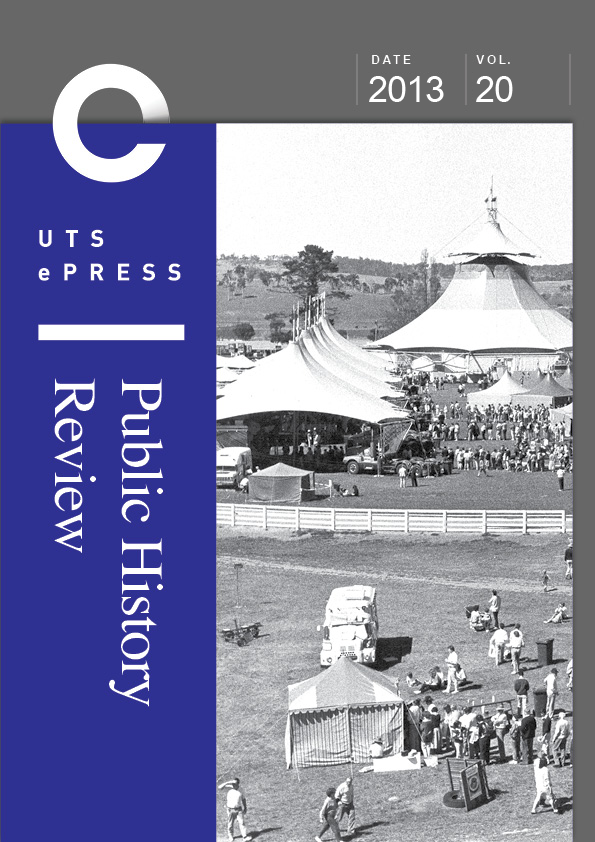History Making: The Historian as Consultant
Main Article Content
Abstract
Article Details
Issue
Section
Authors who submit articles to this journal from 31st March 2014 for publication, agree to the following terms:
a) Authors retain copyright and grant the journal right of first publication with the work simultaneously licensed under a Creative Commons Attribution License that allows others to share and adapt the work with an acknowledgement of the work's authorship and initial publication in this journal.
b) Authors are able to enter into separate, additional contractual arrangements for the non-exclusive distribution of the journal's published version of the work (e.g., post it to an institutional repository or publish it in a book), with an acknowledgement of its initial publication in this journal.
c) Authors are permitted and encouraged to post their work online (e.g., in institutional repositories or on their website) prior to and during the submission process, as it can lead to productive exchanges, as well as earlier and greater citation of published work (See The Open Access Citation Advantage Service). Where authors include such a work in an institutional repository or on their website (ie. a copy of a work which has been published in a UTS ePRESS journal, or a pre-print or post-print version of that work), we request that they include a statement that acknowledges the UTS ePRESS publication including the name of the journal, the volume number and a web-link to the journal item.
d) Authors should be aware that the Creative Commons Attribution (CC-BY) License permits readers to share (copy and redistribute the work in any medium or format) and adapt (remix, transform, and build upon the work) for any purpose, even commercially, provided they also give appropriate credit to the work, provide a link to the license, and indicate if changes were made. They may do these things in any reasonable manner, but not in any way that suggests you or your publisher endorses their use.
For Vol 20 (2013) and before, the following copyright applied:
Authors submitting articles to UTSePress publications agree to assign a limited license to UTSePress if and when the manuscript is accepted for publication. This license allows UTSePress to publish a manuscript in a given issue. Articles published by UTSePress are protected by copyright which is retained by the authors who assert their moral rights. Authors control translation and reproduction rights to their works published by UTSePress. UTSePress publications are copyright and all rights are reserved worldwide. Downloads of specific portions of them are permitted for personal use only, not for commercial use or resale. Permissions to reprint or use any materials should be directed to UTSePress.
References
Ahonen, S. 2012. Coming to Terms with a Dark Past: How Post Conflict Societies Deal with History, Frankfurt am Main, Berlin, Bruxelles, New York, Oxford, Wien, Peter Lang.
Ashton, P., Hamilton, P. & Searby, R. 2012. Places of the Heart: Memorials in Australia, North Melbourne, Australian Scholarly Publishing.
Gardner, J. B. 2010. Trust, Risk and Public History: A View From the United States. Public History Review, 17, 52-6.
GLASER, E. 2013. We are just more subtle about our propaganda. Guardian Weekly, 24 May.
Groot, J. D. 2009. Consuming History: Historians and heritage in contemporary popular culture, London and New York, Routledge.
Kalela, J. 1991. Patronage as a problem of adult education. The significance of research done by ordinary people. Paper presented to the 1991 World Conference on Comparative Adult Education, Ibadan, Nigeria.
Kalela, J. 1991. Patronage as a problem of adult education. The significance of research done by ordinary people. Paper Presented to the 1991 World Conference on Comparative Adult Education, Ibadan, Nigeria.
Kalela, J. 2000. Historiantutkimus ja historia, Helsinki, Gaudeamus.
Kalela, J. 2012. Making History: The Historian and Uses of the Past, Basingstoke, Palgrave Macmillan. https://doi.org/10.1007/978-0-230-35658-0
Kean, H. 2004. London Stories: Personal Lives, Public Histories, Sydney and Chicago, Rivers Oram Press.
Kean, H. 2011. Introduction. Public History Review, 18, 1-11.
KEAN, H. 2013. Introduction. In: KEAN, H. & MARTIN, P. (eds.) The Public History Reader. London and New York: Routledge. https://doi.org/10.1525/california/9780520275591.003.0001
Kean, H. & Martin, P. (eds.) 2013. The Public History Reader, London: Routledge.
Ricoeur, P. 1988. Time And Narrative, Chicago and London, The University of Chicago Press.
Rosenzweig, R. 1998. Everyone a historian. In: Rosenzweig, R. & Thelen, D. (eds.) The Presence of the Past: Popular Uses of History in American Life. New York: Columbia University Press.
Rosenzweig, R. & Thelen, D. 2013. The Presence of the Past: popular uses of history in American life. In: Kean, H. & Martin, P. (eds.) The Public History Reader. London: Routledge.
Samuel, R. 1994. Theatres of Memory, Vol 1. Past and Present in Contemporary Culture. London and New York: Verso.
Samuel, R. 1998. Island Stories: Unravelling Britain, Vol 2. Past and Present in Contemporary Culture. London and New York: Verso.
Thelan, D. 1998. A Participatory Historical Culture. In: Rosenzweig, R. & Thelen, D. (eds.) Presence of the Past: Popular Uses of History in American Life. New York: The Columbia University Press.
WHITE, H. 2007. Afterword: manifesto time. In: JENKINS, K., MORGAN, S. & MUNSLOW, A. (eds.) Manifestos for History. London and New York: Routledge. https://doi.org/10.1201/b13957-13
